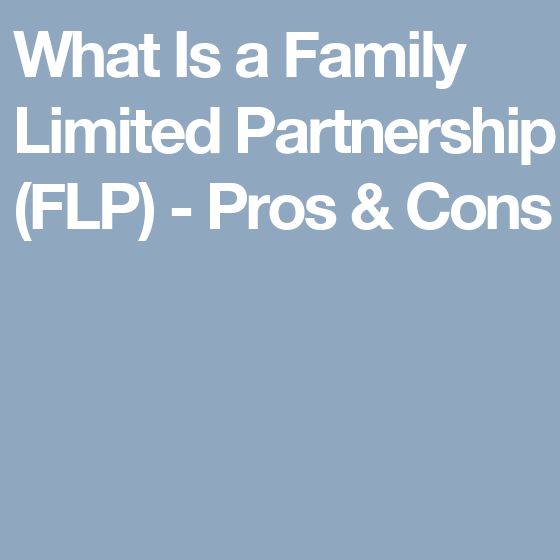Family Limited Partnerships: Pros and Cons

Family Limited Partnerships: Pros and Cons
A new approach to managing family wealth, the family limited partnership (FLP) has become popular in recent years. As an alternative, a Family Limited Liability Company may be used with similar results. These techniques offer several possible advantages:
Family Limited Partnerships
• consolidation of assets for convenient management;
• segregation of assets for liability protection;
• gift tax valuation discounts.
In a typical FLP, the parents transfer assets in exchange for general and limited partnership interests. Interests in closely held businesses, real estate, marketable securities or other appreciated assets may be placed in the partnership. As general partners, the parents continue to have complete control and responsibility for the partnership assets. Limited partners typically have only a right to receive a proportionate share of partnership income. Furthermore, the limited partnership interests are usually subject to significant restrictions on transferability.
The parents transfer the limited partnership interests to their children, usually over a period of years. The gift of a limited partnership interest qualifies for the $11,000 annual exclusion from gift tax, so there will be no tax due on small transfers.
Example: Parents transfer property worth $4 million to an FLP in exchange for a 25% general partnership interest and 3,000 limited partnership shares. Each limited share this would be worth $1,000 (but see farther on concerning the issue of discounts). Each parent may transfer 11 shares each year to each of as many beneficiaries as desired before a gift tax is due. If there are two children and three grandchildren, that means that $110,000 in value may be gifted tax free.
After the transfer, each limited partner will owe income taxes on his or her proportionate share of partnership income. The parents will continue to manage the property. There is no gain or loss to the parents upon the contribution of assets to the partnership. Built-in gain in an asset will be recognized by the parent if the asset is sold—it is not possible to shift such gains to the other partners.
Asset protection
In most FLPs the restrictions on the limited pros and cons of partnership interests are such that the partnership assets are fully protected from the claims of creditors of the limited partners. With its many restrictions, the limited partnership interest is not typically awarded to a divorcing spouse in the event that a marriage fails. If a nonfamily member should acquire a limited partnership interest as a result of divorce, the partnership agreement can require that the interest be sold to the remaining partners.
The parents also may acquire some protection of the assets from their future creditors.
The implicit leverage of valuation discounts
At one time IRS argued that all the shares held by family members should be valued as a single large block, because the family members did not have interests adverse to one another. However, this position was rejected by the courts, opening up the possibility of discounts for gifts within the family.
With the severe restrictions on transferability and the absence of any control over the business enterprise, the limited partnership interests are usually eligible for significant valuation discounts, ranging from 15% to 50%. In our example, if a 50% discount is appropriate, each parent could transfer 22 shares to each child or grandchild each year without gift tax, a total of 220 shares. If the shares did not increase in value, over a ten-year period, 2,200 limited partnership shares could be transferred, and over 15 years all the limited partnership shares, initially worth $3 million, could be transferred tax free.
If the shares rise in value, the tax-free gift program would take longer to complete. But then all post gift appreciation in value would completely escape estate and gift taxation.
Problems
Because the development of family limited partnerships is fairly recent, there is a bit of uncertainty associated with them. There are many potential tax traps, so the advice of tax specialists is a must. In addition, there are significant costs associated with setting up and monitoring a family limited partnership disadvantages, including an initial appraisal and additional appraisals every time that a gift is made.
The IRS is apt to scrutinize FLPs closely and challenge the size of the valuation discounts applied to the limited partnership shares. The burden of proving the appropriateness of the discounts (and the costs of expert opinions in support of them) falls on the taxpayer. There is very little case law to provide guidance on what may be expected.
In some cases the Service has denied valuation discounts altogether, eliminating all tax benefits. IRS is looking for a valid business purpose for the creation of the partnership, other than to secure tax benefits.
Although family limited partnership asset protection may be a sound way to manage family wealth so long as the parent is alive and in good health, they do not always provide a mechanism to resolve the conflicting objectives of the children. Some of the limited partners may want to liquidate the partnership, while others prefer to have an ongoing investment. Some sort of succession plan needs to be put into place.
One approach to problem resolution is to give each partner the right to sell or withdraw from the partnership, taking a share of the partnership assets. But there’s a paradox: The more flexible and convenient such an arrangement is, the more it encroaches on the valuation discounts, which should not be so steep if limited partners have easy access to the exit.
We hope you found this article about “Family Limited Partnerships: Pros and Cons” helpful. If you have questions or need expert tax or family office advice that’s refreshingly objective (we never sell investments), please contact us or visit our Family office page or our website at www.GROCO.com. Unfortunately, we no longer give advice to other tax professionals gratis.
To receive our free newsletter, contact us here.
Subscribe our YouTube Channel for more updates.

Alan Olsen, is the Host of the American Dreams Show and the Managing Partner of GROCO.com. GROCO is a premier family office and tax advisory firm located in the San Francisco Bay area serving clients all over the world.
Alan L. Olsen, CPA, Wikipedia Bio

GROCO.com is a proud sponsor of The American Dreams Show.

The American Dreams show was the brainchild of Alan Olsen, CPA, MBA. It was originally created to fill a specific need; often inexperienced entrepreneurs lacked basic information about raising capital and how to successfully start a business.
Alan sincerely wanted to respond to the many requests from aspiring entrepreneurs asking for the information and introductions they needed. But he had to find a way to help in which his venture capital clients and friends would not mind.
The American Dreams show became the solution, first as a radio show and now with YouTube videos as well. Always respectful of interview guest’s time, he’s able to give access to individuals information and inspiration previously inaccessible to the first-time entrepreneurs who need it most.
They can listen to venture capitalists and successful business people explain first-hand, how they got to where they are, how to start a company, how to overcome challenges, how they see the future evolving, opportunities, work-life balance and so much more..
American Dreams discusses many topics from some of the world’s most successful individuals about their secrets to life’s success. Topics from guest have included:
Creating purpose in life / Building a foundation for their life / Solving problems / Finding fulfillment through philanthropy and service / Becoming self-reliant / Enhancing effective leadership / Balancing family and work…

MyPaths.com (Also sponsored by GROCO) provides free access to content and world-class entrepreneurs, influencers and thought leaders’ personal success stories. To help you find your path in life to true, sustainable success & happiness. It’s mission statement:
In an increasingly complex and difficult world, we hope to help you find your personal path in life and build a strong foundation by learning how others found success and happiness. True and sustainable success and happiness are different for each one of us but possible, often despite significant challenges.
Our mission at MyPaths.com is to provide resources and firsthand accounts of how others found their paths in life, so you can do the same.
Athletes Could See Big Tax Savings With Trump Proposals
It’s no secret that Donald Trump’s proposed tax plans would definitely benefit the nations’ wealthiest individuals. The president elect has made it clear he wants to overhaul our country’s tax system and his stated proposals indicate that the wealthy will see a healthy increase in the amount of money they get to keep. Among…
Tax Tips for Entrepreneurs
If you’re looking to start a new company in the coming year then you certainly have a lot on your mind, not the least of which is how you will get started, what will you do to market your company and what are your chances of achieving success. The concerns and issues are endless…
IRS Announces New Inflation Adjustments for 2017
While the 2016 tax year is still not quite over, the IRS has already announced some important inflation adjustments for the 2017 tax year, which taxpayers will file for in 2018. While you might be more worried about your upcoming tax return, there are some important changes to know about. However, that being said,…
IRS Changes Deadlines for 1099 Forms
It’s almost January. Are you ready for taxes? Of course, Form 1099s are an important part of any tax season, and this coming year will be no different. As a taxpayer, if you receive any kind of Form 1099 don’t ignore it. The IRS will get the same form and you will be held…




